#i need a giant corkboard
Text

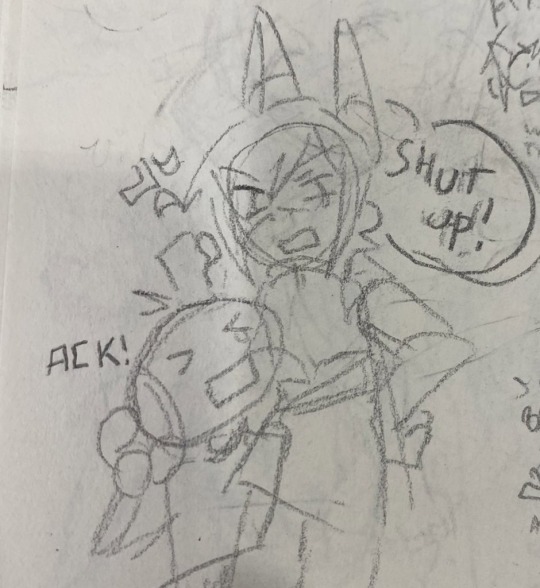


collection of Things .... i hate that i only post completed art on here i tbink i should have a little fun

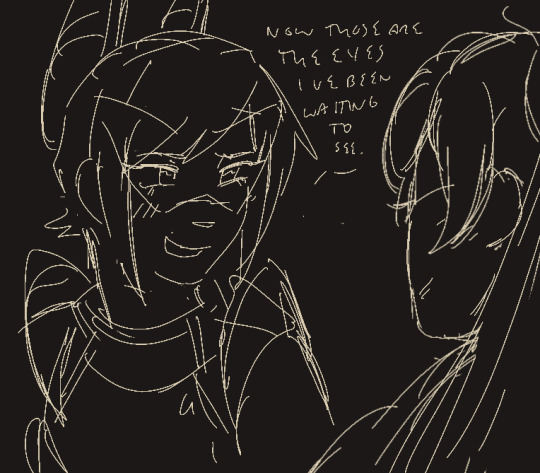
my aurametis bayonetta cringe gets put under the cut bevause i genuinely start losing it evedytime i see it HELP
#that cheshire one is part of something big GET READY!!!!#chem class is beating my ass my godddfff I Hate it here#anywayf#yea i think i should post more doodles on here IDK! someone Let me know#i also have an aa5 bayo origins au brewing i think i have aproblem#i need a giant corkboard wifh pins and red string#ace attorney#bayonetta#aura blackquill#metis cykes#athena cykes#aurametis#bayonetta origins#<- i still think its crazy i have this url btw#art#my art#2024
34 notes
·
View notes
Text
yk when you're talking to yourself about mcsm analysis whatnot and then you accidentally figure out a cool detail that ties multiple characters together?
hehe :)
#this may or may not be about some of the antagonists#and i may or may not have been trying to piece together my thoughts on a certain blondie#it's stella#it's always stella when it comes to analysis tbh#oh my goodness stella is so fun to analyze#ty eric stirpe for writing her#i need to have a giant corkboard and a crap ton of yarn and pictures of mcsm characters because i will figure out something i promise#mcsm#mcsm stella
12 notes
·
View notes
Text
Dungeon Meshi - Quick Reacts (CHA 17: Raspberries)

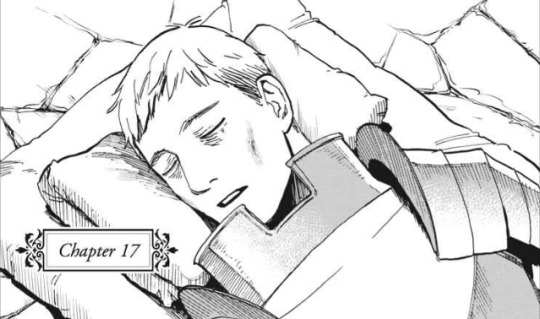
DID WE LOSE OUR BOY?????

We all need a friend like Chilchuck.

.......................I wonder if it really IS a health enough ecosystem to sustain itself OR if someone is going around resurrecting monsters.
........................................or the adventurers and everything else are just the microbiome of a giant beast. 😌

or maybe the real beast was capitalism all along.
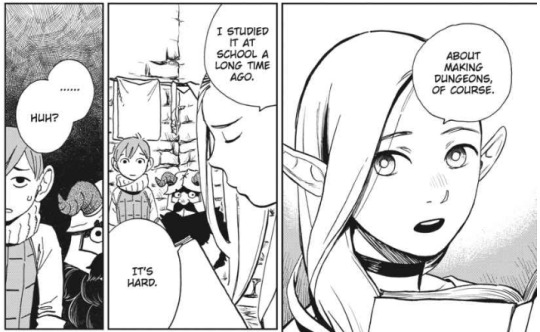
I’ll second that. HUH?
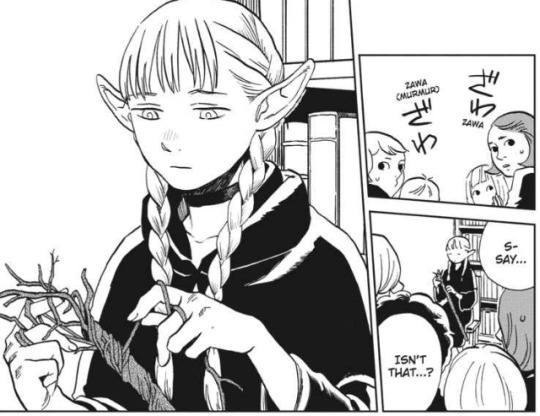
baby Marcille time? 👀

...............Press X to Doubt.
Is that REALLY how it went down?
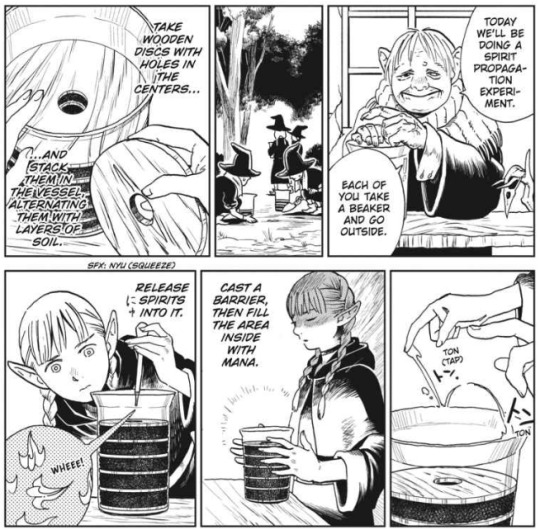
..........what ARE those spirits? Aside from being utterly adorable with their cheering as they are released like some sort of plankton into a beaker filled with mana, which is presumably what they feed on... we don’t really know much about them?
Are they.......human spirits? Something else??????

This is saying so much and nothing at all, and at the same time feels. Eerily important.
So the dungeon is a source of contained mana. An ecosystem with magic, where spirits - humanoids and monsterkind - are kept alive by the mana? But also if there’s too much of it, or too little, they die.
This presumes that there is no mana on the outside world. And mana must be obtained and collected in the dungeon. By what means? Does it just kinda permeate into you naturally? Does eating monsters help you get more mana??
Do people who are outside lose their mana? Is there other sources of mana? Is it inherent to everyone?
And if not..........who is the keeper of the actual dungeon they’re traversing now? Is it all just an experiment on a larger scale????
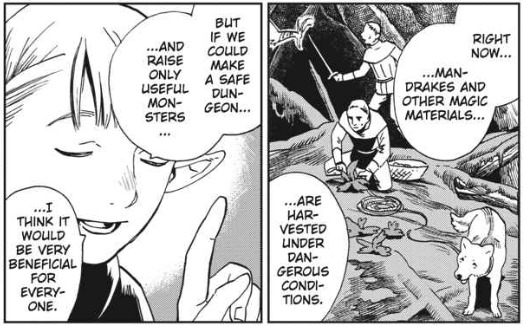
THE RETURN OF THE DOG
Interesting. What would Marcille consider useful as a monster? Plantlike monsters? She seems opposed to eating them, so what else is there?

IS THAT FALLIN

Fallin was previously described by Marcille as... REALLY strong. This seems to be a curious beginning for her, if that’s the case.

...................what happened to Falin and Laios’ parents, huh.

well..................fermentation DOES speed up the creation of spirits. 😂
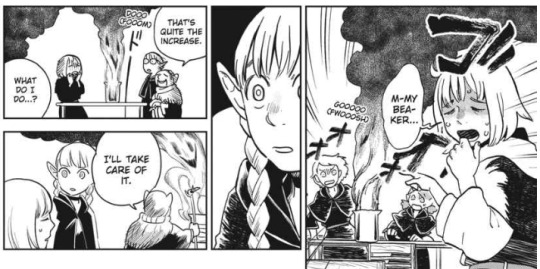
Did she raise them...? Or is there something else at play???
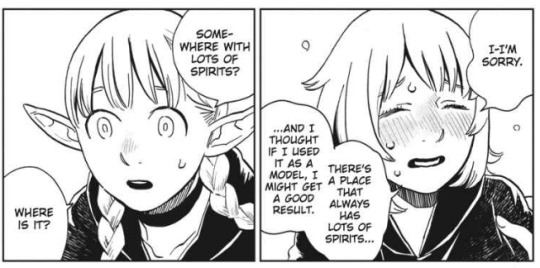

......................the real dungeon.......has impurities in the soil and holes in the barrier and the mana is weakening? Is that what’s driving monsters to the top layers? There’s an unbalancing of the ecosystem so they’re all trying to get more food and consequently pushing the whole niche system up?
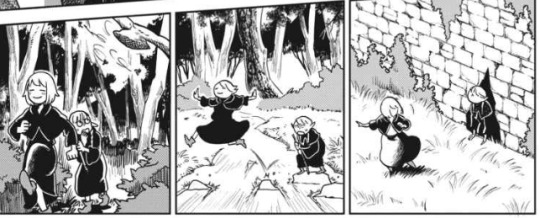
Secret tunnel, secret tunnel............
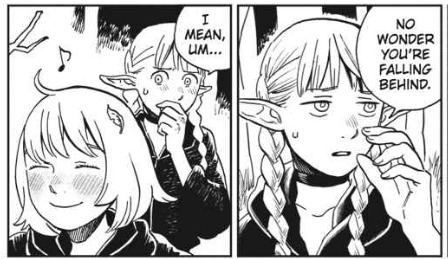
Aww, look at her widdle face.
I love them.
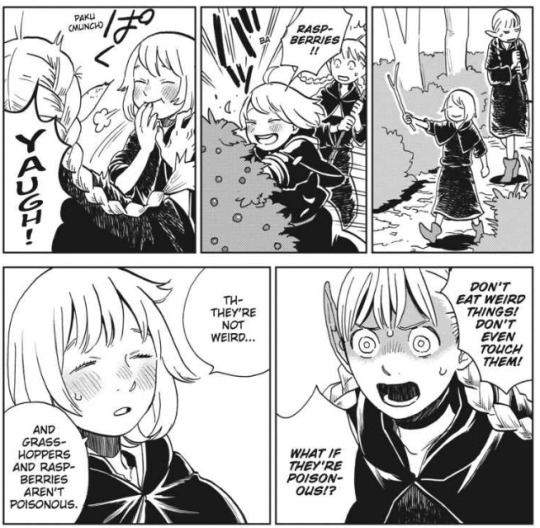
An incredible dynamic already, this is fun.
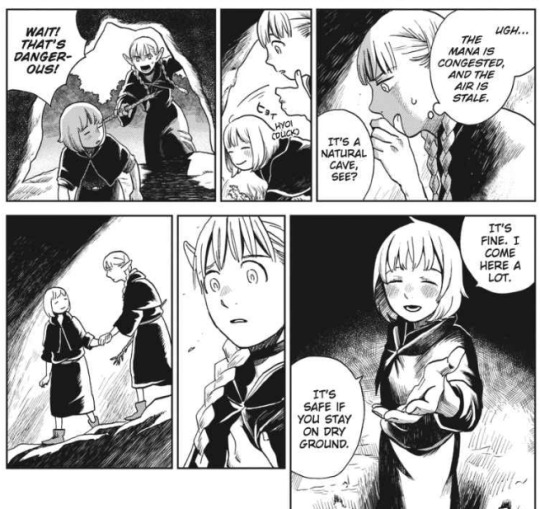
If the dungeon is indeed like a giant animal or an organism... the fact that it’s bleeding mana and has poisoned areas does not bode well. It’s almost like a rotting carcass at that point, being pillaged for its resources while it slowly expires to the point of not being useful.....

Is this..........A dungeon? Or THE dungeon? Are they one and the same? Are they all connected??

Marcille and Senshi are surprisingly alike.

I’m gonna need a bigger corkboard.............

Awww, she’s so serious! She really does have noble goals, even if her approach is a bit naive.
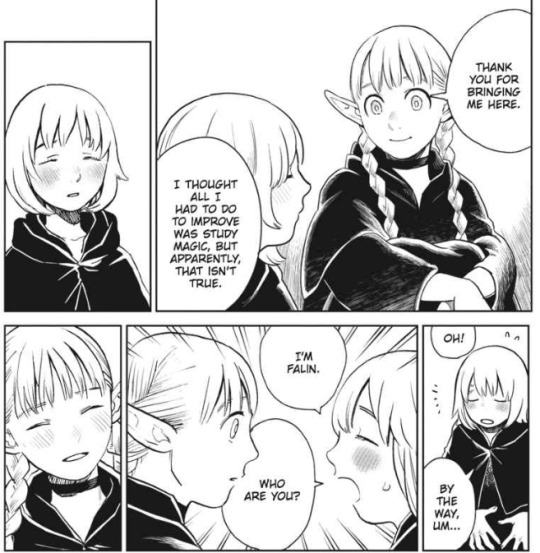
okay but.

Why are they so wholesome?
Marcille is clearly popular and respected, but instead of throwing aside Falin’s way of doing things she asked questions. She asked to see her process. She didn’t react well to things she doesn’t know a lot about (grasshoppers, raspberries) but she was willing to learn! She didn’t just bully or dismiss Falin for being different, she actually wants to collaborate!
THESE GIRLS


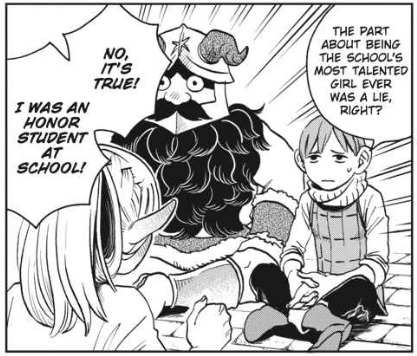
Chilchuck is kinda with me on this one lmao

......If the dungeon really is man-made, I think you’re gonna have bigger issues than simply one magician. That’s literally a terraforming demigod that fucked around without having a Dungeon Degree.
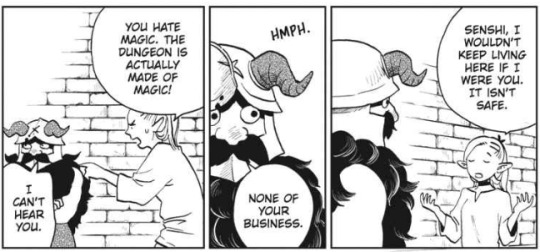
I love them.
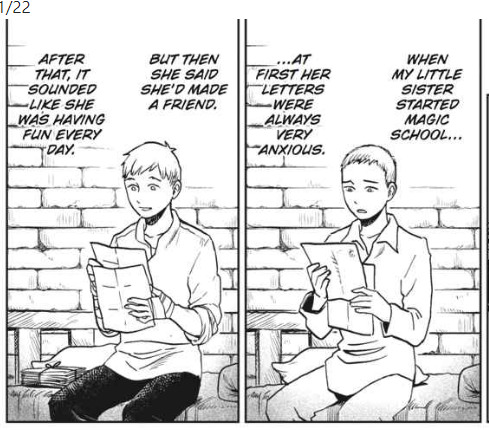
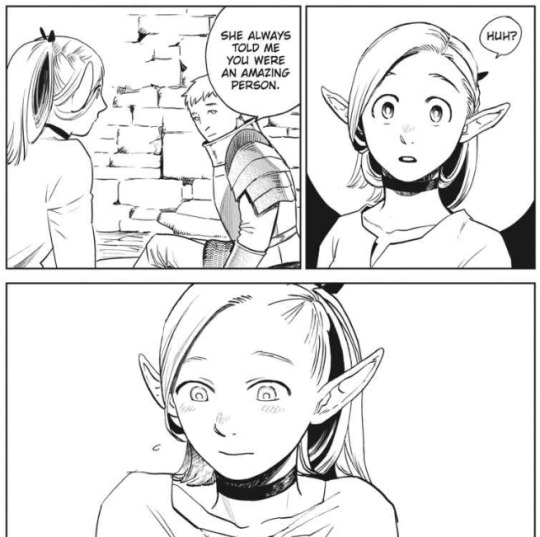
oh it’s on you guys.


.................Marcille is kind.

Yes, go rescue your girlfriend, Marcille!!! I believe in you!!!
328 notes
·
View notes
Note
I love your Orbulon and space bunnies are sea creatures propaganda how do you even come up with that it’s so cool‼️
Thank you!! A fun fact about me is that i am actually insane about invertebrates. So when wario presented me with two made-up invertebrates i went a little insane. I do play it kind of fast and loose with these guys so i'm sure an actual specbio enthusiast would not be impressed but i'd say 40% of my creative decisions are also based in what would be the funniest (such as making sure the polyp looks like a bowling pin)
I have hinted at this via my orbiology poster but i have an entire orbulon corkboard living in my head so here is the bulk of that iceberg
Based on orbulon's aversion to heat, big ol' sunglasses, and milky complexion, i think that he is the interstellar equivalent of a cave olm. Instead of an underground cave i think he lives on a gas giant far from his system's sun, which would be cold, dark, and have a thick atmosphere for him to "swim" through. ("What about the air pressure?" You say. "Hold your horses" I say. "It will all be worth it in the end.") This reason i think it is worth it is because my model for this is uranus, the gas giant whose atmosphere contains notable amounts of, and i cannot stress this enough, methane. Tell me a more warioware planet
I also think that his planet is predominantly blue, not just because of the youranus thing but also because whenever he gets really scared he literally turns blue. Check it out


I think this is NOT the same as blushing, but a fear response similar to cuttlefish changing color to camouflage with their environment via chromatophores in their skin. Unfortunately when orbulon is scared shitless he does a bad job of it and just defaults to his home planet color, but when he actually thinks about it he can change his color and shape to be whatever he wants (such as a pretty woman).
3. On a similar note, orbulon does not have teeth but he can shapeshift his mouth to create the facsimile of teeth. This is a cool party trick but you need to know that the fake teeth are still squishy and it's really gross.
4. Orbulon's eyes are uber-sensitive to light which is why he needs those impenetrable coke-bottle sunglasses. He also doesn't have eyelids, so during his 24-hour naps his eyes are open the whole time. Sweet dreams.
5. This is going to veer out of plain biology and into his society so i'm not going to go too deep into this but basically i think that telepathy is an integral part of intraspecies communication and that their society is very communal as a result. Think like ants with pheromones, not a hivemind in that they lose their individual identities but they're definitely less atomized than humans. They're also wildly intelligent and have canonically developed time travel technology to the point where the average person can just have a time machine built into their car. This gives a little insight into orbulon's mindset here


(I don't think he's very clever by orbulon standards)
This is getting too long and crazy so i'm going to top it off with one more thing. I know orbulon is supposed to have smooth skin but in my heart i wish he had the texture of these bad boys

#If any of this is contradicted by the new game that just came out do NOT tell me i will cry#not art
30 notes
·
View notes
Text
Yearning
So, because there is a tragic lack of Monnk fics, I decided to write one. So. Ta-dah~
Pairing: Commander Monnk x Reader
Word Count: 1366
Songs: I recommend Je T'aime by Kelly Sweet
Warnings: None
Prompt: "...say it again."
You hum happily as you slide down the hallway in your fuzzy socks, stumbling to a stop in front of the calendar. There, marked in vibrant yellow, were the words, ‘Monnk returns’.
Your friend, your best friend, has been gone for close to six months now, and he sent a message several days ago that he was finally returning to Coruscant with his Battalion.
Oh, you’re sure that he’s going to have things to do before he makes his way here. After all, you’re just friends.
You scan the corkboard thoughtfully. It’s completely covered in pictures. Pictures of you and Monnk. Pictures of the pair of you at the aquarium, posing in front of a giant squid. Pictures of you at the communal pool, both of you in your bathing suits.
Pictures of Monnk teaching you how to surf, though you’re really bad at it. And pictures of you teaching Monnk how to snowboard, he’s really good at it annoyingly.
Actually, all of the pictures on the corkboard are of you and Monnk.
But that makes sense. You’ve been in love with him for years now after all.
You smile as you pick up one of the pictures, one of you and Monnk having a picnic. His arm is flung over your shoulder and his chin is resting on your shoulder while you take the selfie. It’s your favorite picture of the pair of you. The same picture is framed next to your bed…and sits on your desk at the office.
Your chrono chimes a warning, and you curse. You’re late. You’ve been late all morning. And now you’re extra late. You toss the picture on the counter and run down the hall, to the closet where your shoes are kept.
You balance on one foot, topple over, ignore your throbbing elbows and quickly pull your shoes on, before scrambling back to your feet and running out the door.
Your boss is going to have your head. Well, unless you bring her Caf.
Thank the Force for easily bribed bosses.
12 hours later, your boss finally releases you for the day. Sometimes, being a personal assistant sucks. Like today, when you spent the majority of the day arguing with closed-minded people about whether or not they were allowed to talk to your boss.
And then there was the jerk who decided that punching you was a clever way to force his way into your boss’ office. All it got him was a one way ticket into a holding cell and blacklisted from the business in general.
You prod the bruise under your eye with a pout. Your boss had been incandescent with rage when she saw that you were hurt, but had needed you to remain for the rest of your shift in spite of your injury.
Still, she gave you the next two weeks off, as payment for being assaulted while at work, so you figure you came out on top. Even if you are bruised and tired and hungry.
You absently check your com, no messages - but you really didn’t expect Monnk to message you until tomorrow at the earliest. You consider sending him a message, but ultimately decide against it.
No need to be annoying. You’re just friends after all.
So instead you pull up the app to your favorite restaurant, order enough food for two people, so they would deliver to your apartment, and you head for the taxi stand to catch a ride home.
You arrive at the apartment complex at the same time as the delivery droid, and you cheerfully ID yourself and pay the droid, before you enter the building and take the lift to your floor.
You check your mailbox, and are pleased to see that there aren’t any bills in the box at all, and then you enter the code to your apartment. The door slides open, and then slides closed with a quiet chime, an upgrade that Monnk added for you when you mentioned that you hated how quiet the door was.
And the first thing you notice is the armor neatly stacked near the front door.
Armor painted a deep yellow color.
You toss your jacket over the familiar helmet, and kick your shoes off, “Monnk?” You call as you head towards the kitchen, now noticing that some of your lights were on.
“Yeah, I’m here,” You step into the kitchen and smile at Monnk. Taller than you, and broader, with dyed blonde curly hair. And you knew that under his shirt was a massive sea serpent tattoo that you guessed covered the majority of his body.
“Welcome back,” You say warmly, smiling at the back of his head, “I wasn’t expecting to hear from you until later.” By the smell, he was brewing caf.
“Yeah, well…” He shrugs a single shoulder, “I wanted to see you and didn’t want to see my brothers.”
You laugh, and set the food on the counter, “Good thing I ordered enough for two, then.”
He pauses, “Oh? Expecting company?” Monnk asks, his voice just a little too casual for it to be true.
“Of course not,” You reply, “You know I’m horribly unlikeable.” You joke as you move around the kitchen and grab some plates, “I didn’t feel like picking up food, so I ordered enough to get it delivered.”
“Lazy.” Monnk chided, though there was amusement in his voice.
You sniff, “I had a rough day, Monnk. I’m allowed.”
He finally turns away from the brewing caf, “Yeah? Did someone ye-” He stops mid-sentence, his golden brown eyes locked on the bruise on your cheek, “Someone hit you.”
You shrug, awkwardly, “Yeah. Like I said, I had a rough day.”
He crosses the room in three large strides, and lightly grips your chin to tilt your head so he can see the bruise better. “Were you seen by a medic?” He asks, as he lightly prods the mark, apologizing silently when you wince.
“No, I needed to stay-” You explain, smiling softly when you see the look of indignation sliding across his face, “It only hurts when I touch it, Monnk, really.”
“It shouldn’t have happened at all, cyare.” He replies under his breath, “It doesn’t feel like anything’s broken at least.”
You hum in agreement. He’s right, of course, it shouldn’t have happened, but it did. “You’ve called me that before. Cyare. What’s it mean?”
“Didn’t I tell you to look it up?” Monnk asks as he finally releases your chin and heads back to pour himself a mug of caf.
“You really think Mando’a to Basic dictionaries are common here? Come one, throw me a bone, Monnk.” You say as you start divvying out the food.
“Nope,” He sets his caf at the table, “What do you want to drink?”
You pout at him, but he just grins and leans against the counter, so you huff, “Some of my water please.”
“As you wish,” He replies easily, with a sketched bow.
You watch him straighten and grab a glass from your cabinet, and you watch him pour a glass of the flavored water you prefer, and you smile. “...I love you,” You say.
Monnk freezes mid-step and he stares at you wide eyed. “You…what?”
Your stomach flips with anxiety, but in for a credit, or so they say. “I said I love you.”
He sets your glass on the counter and walks over to you, his hands come up and cup your face, his gaze locked on your face. “...say it again.” He breathes out.
“I love-” You’re unable to finish the sentence as his lips crash against yours. He kisses you hungrily, like he needs you as much as he needs oxygen. “-you.” You finish as he breaks away.
“In case it wasn’t obvious,” Monnk murmurs against your lips, his breath hot against your skin, “I love you too.”
You don’t know what to say, and instead you lean up and kiss him. And you’re not surprised when he immediately deepens the kiss, and tugs you closer. You have a ghost of a thought that dinner was going to get cold…but then he nips your lower lip and you realize that you don’t care.
38 notes
·
View notes
Text
Transcript Episode 83: How kids learn Q’anjob’al and other Mayan languages - Interview with Pedro Mateo Pedro
This is a transcript for Lingthusiasm episode ‘How kids learn Q’anjob’al and other Mayan languages - Interview with Pedro Mateo Pedro’. It’s been lightly edited for readability. Listen to the episode here or wherever you get your podcasts. Links to studies mentioned and further reading can be found on the episode show notes page.
[Music]
Gretchen: Welcome to Lingthusiasm, a podcast that’s enthusiastic about linguistics! I’m Gretchen McCulloch. I’m here with Dr. Pedro Mateo Pedro who’s an Assistant Professor at the University of Toronto, Canada, a native speaker of Q’anjob’al, and a learner of Kaqchikel. Today, we’re getting enthusiastic about kids acquiring Indigenous languages.
But first, some announcements. We love looking up whether two words that look kind of similar are actually historically related, but the history of a word doesn’t have to define how it’s used today. To celebrate how we can grow up to be more than we ever expected, we have new merch that says, “Etymology isn’t Destiny.” Our artist, Lucy Maddox, has made “Etymology isn’t Destiny” into a swoopy, cursive design with a fun little destiny star on the dot of the eye, available in black, white, and my personal favourite, rainbow gradient. This design is available on lots of different colours and styles of shirts. We’ve got hoodies, tank tops, t-shirts in classic fit, relaxed fit, curved fit – plus mugs, notebooks, stickers, water bottles, zipper pouches. You know, if it’s on Redbubble, we might’ve put “Etymology isn’t Destiny” on it.
We also have tons of other lingthusiastic merch available in our merch store at lingthusiasm.com/merch. I have to say, it makes a great gift to give to a linguistics enthusiast in your life or to request as a gift if you are that linguistics enthusiast.
We also wanna give a special shoutout to our aesthetic redesign of the International Phonetic Alphabet. Last year, we reorganised the classic IPA chart to have colours and have little cute circles and not just be boring grey lines of boxes and to even more elegantly represent the principle that the location of the symbols and rows and columns represents the place and degree of constriction in the mouth. I think it looks really cool. It’s also a fun little puzzle to sit there and figure out which of the specific circles around different things stands for what. We’ve now made this aesthetic IPA chart redesign available on lots more merch options, including several different sizes of posters from small ones you can put on a corkboard to large ones you can put up in your hallway. They look really, really good, especially if you have some sort of office-y space that needs to be decorated. Plus, it’s on tote bags and notebooks and t-shirts. If you want everyone you meet to know that you’re a giant linguistics nerd, you can take them to conferences and use them to start nerdy conversations with people.
If you like the idea of linguistics merch but none of ours so far is quite hitting your aesthetic, or if there’s an item that Redbubble sells that you think one of our existing designs would look good on, we’ve added quite a few merch items in response to people’s requests over the years, so we’d love to know where the gaps still are and keep an eye on lingthusiasm.com/merch.
Our most recent bonus episode was a behind-the-scenes interview with Sarah Dopierala, who you may recognise as a name from the end credits, about what it’s like doing transcripts from a linguistics perspective and her life generally as a linguistics grad student. You can go to patreon.com/lingthusiasm to get access to all of the many bonus episodes and to help Lingthusiasm keep running.
[Music]
Gretchen: Hello, Pedro, welcome to the show!
Pedro: Hello. Thank you so much for this invitation. I really appreciate it.
Gretchen: We’re really excited to have you. Let’s start with the question that we ask all of our guests, “How did you get interested in linguistics?”
Pedro: That’s an interesting question. I think there’re two main things. One is that I had the opportunity to attend a boarding school where there were many Mayan languages and, in addition to that, there was a class on grammar of Mayan languages, and I think that’s one of the things that motivated me to be curious about that language. Then after becoming an elementary school teacher, I was also interested about knowing more about how these languages work. For example, how language works in this case – well, in the case of Guatemala, for example, people think – I am assuming that that was in the past, but there’s, I think, some people who still think that Indigenous languages don’t have a grammar from there as well. Is it true that, in fact, there’s no grammar of this language? That’s kind of how I started –
Gretchen: There’s no language with no grammar.
Pedro: That’s true. I like when people say that everybody has a mental grammar. I like that. Which is true for every language as well. It’s how I would say I got interested in linguistics.
Gretchen: And you’re already a speaker of Q’anjob’al, and so going to this boarding school and being exposed to other people speaking other languages.
Pedro: Also, I acquired Q’anjob’al when I was a kid. And then I went to this boarding school. But unfortunately, I didn’t know any of those languages until later when I started living with my wife who is a native speaker of Kaqchikel, and from there I started to learn, but it has been a long process for me.
Gretchen: To learn different ones. So, you were at boarding school, and you’re encountering, “Okay, Mayan languages have grammar – great!” What happened after that?
Pedro: When I graduated from this boarding school, I became an elementary school teacher. I taught, I think, a couple of years. But one thing that I noticed is that there was that need to understand a bit more of the language. I thought, well, this is something that one of my best friends, who is Eladio Mateo Toledo, he said, “Well, let’s find someplace to go.” We went to school in Guatemala City to study sociolinguistics at that time. I’m talking about years ago. But it was a way to find opportunities to learn a little bit more about the languages.
Gretchen: So, you studied sociolinguistics in Guatemala City and thought, “Oh, this is cool. I wanna do more of it”?
Pedro: I finished sociolinguistics, and then I received a fellowship or a scholarship in a different university. It’s Universidad Rafael Landívar. There was this project called “EDUMAYA” where there were scholarships to Mayan speakers or Indigenous speakers in Guatemala. This was an opportunity for me to get an undergrad in linguistics. After that, I think I took two or one year off, but while I missed those years from school, I was working at OKMA – Oxlajuuj Keej Mayab’ Ajtz’iib’ – under the direction of Nora England.
Gretchen: What is this organisation?
Pedro: This organisation works on Mayan languages. It’s a group of Mayan speakers who studied their own language.
Gretchen: That sounds great.
Pedro: It was really great. In that case, I was an elementary school teacher, and then I started to work very hard at OKMA. It was a huge difference teaching kids and then doing analysis on a language. For me it was a big transition, but it was amazing because I had the opportunity to learn many things about how Mayan language work. It was unique.
Gretchen: And the kids that you were teaching when you were teaching in school were Mayan kids as well?
Pedro: Yeah, most of them were Mayan kids, so they spoke Q’anjob’al. Even though there is this idea about bilingual education in these Indigenous communities, I had this opportunity to teach these children in Q’anjob’al. One of the norms of education is you teach these kids, and they have to learn Spanish and something like that. So, what I did is, okay, let’s take as the base the knowledge that they bring from home. They speak the language, they understand the language, so we need to teach them how to write and read. That’s what I did. I was in trouble because the parents didn’t like the idea of teaching the children in Q’anjob’al.
Gretchen: They wanted them to learn Spanish.
Pedro: Exactly. They said, “Why do we need Q’anjob’al? Why do we need to write when we speak the language?” One of the arguments I made is, okay, yeah, but we need something already that will help us to learn to write and read. It took me a while. One way to convince the parents to change their mind was that, in the first meeting when they came in to get their children’s grade, I started the meeting in Spanish. I messaged them in Spanish. It didn’t last for a minute, and they stopped me. They started to complain and say, “Why would you talk to us in Spanish when, in fact, you know that we speak Q’anjob’al?” Different people, they were angry or uncomfortable because of that. After that, I asked them this question, “Have you thought about your children who spend about five or six hours every day here at school?”
Gretchen: “And if I speak to them in Spanish, they’re not gonna understand me either.”
Pedro: Exactly. That was my point. And this “Oh, yeah, yeah.” “Have you thought about that? Do they complain?” “No.” “Okay, because they are kids.”
Gretchen: They don’t know any better, yeah.
Pedro: For me, it’s important for these children to understand what’s going on in school. One way to do this – using the language that they know. I was able, in this case, to talk with the parents, “Okay, we understand what you are after.” I had the opportunity then to teach the children, at least, I mean, at that time – so divide a year in two parts. In the first part, I would teach the kids in writing and reading Q’anjob’al. And then in the next part of the year, we switched to Spanish. But at least that was an opportunity to –
Gretchen: They have sort of a balance of the two and accommodation of the two, and they’re not coming in and suddenly someone’s talking at them in a language they don’t understand at all – “Okay, what’s going on?” Yeah.
Pedro: Those were the things that I really liked when I go back to that experience that I had as an elementary school teacher.
Gretchen: Then you started doing language work with other linguists and speakers.
Pedro: Yeah. Again, when I came to OKMA, I started working with a group of Q’anjob’al speakers on the dialectal variation of Q’anjob’al. I was there, I think, less than three years. Then I left Guatemala because my wife had a scholarship, and we went to the US. That’s how I started learning English, and then started the MA and PhD programme at the University of Kansas.
Gretchen: In linguistics as well?
Pedro: In linguistics, yeah. Then I started to work on how children acquire Mayan languages – of course, not all Mayan languages, but I started to work on Q’anjob’al to document how these children acquire Q’anjob’al.
Gretchen: Sort of informed by this experience as a schoolteacher saying, “Okay, these kids are coming in already speaking this language. What’s going on?”
Pedro: I think the question is, “What do they know?” That’s how I got interested in this. Plus, at that time I had my first son who was, I think, one-year-and-a-half or something. It was like, okay, this is an opportunity for me to learn how to document child language acquisition. So, then I started to work on Q’anjob’al.
Gretchen: I think there are a lot of linguists who get interested in child language acquisition because you have a child, you’re spending all this time taking care of your child, “What are they doing?”
Pedro: For me, it was really interesting because, again, going back to when we moved from Guatemala to the US, the first time I took care of my son, so I made basically a diary of what he was saying almost every day. I have my notes – I dunno – somewhere.
Gretchen: Then you started looking at other children as well.
Pedro: Yeah. For my MA, for example, I looked at, I think, eight or ten children. It was a cross-sectional study. As for my PhD, I worked on a longitudinal study. My main focus at that time was on how these children acquire the verb morphology in the language, in this case, the word that indicates action, for example, what happens, and then the different parts that are necessary in that verb, for example. We talk about when the action happened, and who is participating in the action. Those are the kinds of things that I tried to evaluate in my study. That’s something that, also, I have been working on these days.
Gretchen: I mean, this is the kind of thing that it’s not like, oh, you study it for one degree, and now you know everything. This is the kind of thing that people could study for a whole career.
Pedro: Exactly. That’s an interesting point because what I have learned is that, okay, I’m going to – so my advisor said, “Well, you can start with this.” And I said, “Well, okay.” I started studying acquisition of the verb morphology, I think, more than 10 years ago. And I thought, “Well, I am done.” It’s not true! Because every time I look at the data, and I find other things, and I start asking other questions. There is no end of that – which is a nice thing that you start with something small –
Gretchen: You’re not gonna be out of a job.
Pedro: It’s nice. I think one thing that I really appreciate is the opportunity that I have also in documenting acquisition for Mayan languages. For example, I have documented the acquisition of Chuj, another written Mayan language to Q’anjob’al, for example. By looking into a known language, it helps me to understand what must be going on in Q’anjob’al. And I said, “Wow! I wish I had access to this language before so I could have a better idea of how to explain what was going on.”
Gretchen: You can find some things that are similar between Chuj and Q’anjob’al, and some things that are different, because the languages are grammatically, you know, related. They’re similar.
Pedro: That really helped in terms of analysis, in terms of understanding what’s going on, in terms of explaining a specific phenomenon, for example. It really helps to have that kind of mirror, for example, to see what’s going on.
Gretchen: One thing that I know about when kids are acquiring English is they often make mistakes. They’ll say things like “runned” instead of “ran” or something like that. This tells you “Oh, they’re generalising something about a rule.” Are there some things that come up with mistakes kids make or interesting things that kids do when they’re acquiring –
Pedro: That’s an interesting question. That’s something I was looking at, for example, for Chuj and for Q’anjob’al is that, so in Mayan languages, for example, there is this suffix that is known as the “status suffix” that appears after a verb. The idea of this status of something, like, it’s indicating what information is provided by the verb.
Gretchen: “Style” suffix?
Pedro: “Status.” “Status suffix.” It indicates whether the verb is a transitive verb or an intransitive verb. In this case, when we talk about intransitive verbs, it’s one participant of the verb. Transitive verb – two participants.
Gretchen: So, if you have something like “walk,” it’s gonna be intransitive, and it’s gonna have one status suffix. If you have something like, well, the classic example is “hit,” but I always find that very violent – you know, “hug” or something – that’s gonna be transitive. And it’s gonna have a different suffix.
Pedro: A different – yeah. In English, for example, that’s just one form of the verb. But in Mayan languages, or someplace, you have a specific morphology on the verb to indicate that, well, you are talking about an intransitive verb or a transitive verb.
Gretchen: So, if it’s just “I eat,” it’s gonna have one status suffix. If it’s “I eat an apple,” it’s gonna have a different status suffix to indicate that that’s there. Okay.
Pedro: I think, trying to answer your question, that all of this – I mean, there are all things that happen with this status suffix, but I haven’t seen children, for example, producing errors with these status suffixes. One thing that we have seen as maybe “errors” or children overgeneralising is the production of the status suffixes in a specific position. One thing that we know about status suffixes is that sometimes they appear at the end of a verb, and other times, they don’t. But in other times, they do. Then the question is, “What happened?”
Gretchen: And adults know this?
Pedro: An adult knows. But for a child, there are different variations on these status suffixes that a child has to find as a challenge. One thing that we notice is that these children, for example, produce these suffixes in non-final position – something that is not seen –
Gretchen: The adults only produce it at the end of the verb, at the end of the sentence?
Pedro: Yes and no. If they have what we call a “root verb” – consonant-vowel-consonant is the idea.
Gretchen: Consonant-vowel-consonant is a “root verb,” okay.
Pedro: When you have that verb with that “shape,” let’s say, that suffix doesn’t appear in the non-final position. But if you have something that is, let’s say, derived, then that suffix has to be there.
Gretchen: Okay. If you make the verb into something else by changing the tense or something –
Pedro: By changing the status of that word. You have the word “song,” for example, and then you make the verb “to sing,” then you add a morpheme to it so that this noun “song” becomes an intransitive. Because of that, then it’s a derived intransitive verb.
Gretchen: It’s a derived intransitive, and you need to have the suffix. Do the kids do this?
Pedro: They produce that. One thing that we noticed is that they make that difference between derived and non-derived intransitive verbs. Again, it’s like they are acquiring that, but that’s what we see as something problematic for them in acquiring those status suffixes.
Gretchen: They have some difficulties still.
Pedro: That’s, I would say, where we see them making those mistakes or having trouble with acquiring the suffixes.
Gretchen: Is there something that you’ve noticed that’s interesting about how kids are acquiring the languages you’ve worked on?
Pedro: In addition to looking at the verb morphology, I also studied how children acquire the nominal classifier – numeral classifier – in Q’anjob’al. In this case, some Mayan languages have a nominal classifier or a numeral classifier. In this language, for example, everything has to be classified. If you refer to a woman, for example, you’re going to use the classifier “ix,” and then “naq,” for example, for men. Then if you have other things like –
Gretchen: You know, a hat or something.
Pedro: Then it would be “chʼen,” for example.
Gretchen: That’s for objects in general, or are there several different kinds of objects?
Pedro: Well, for animals, for people, for objects, and things like that.
Gretchen: So, if you have a dog or something?
Pedro: That’s going to be different. That’s going to be “no’.” I was interacting with this child. He was a boy. Well, first, he was interacting with his grandmother. These classifiers were there. He was like “ix” or “naq” or “chem” or “ch’en” or “no’” – everything that was –
Gretchen: Everything that you would expect for all the different kinds of things that you can refer to.
Pedro: And then someone came to visit grandma. So, grandma left the conversation, so that left just the boy and myself. This is what happened. All of those classifiers were gone. There’s just one that stayed, which is “ix.”
Gretchen: So, he’s using “ix” for everything.
Pedro: “Ix” for everything. But this is not something that he’s just making up. It’s something that we can see in the other grammar.
Gretchen: Okay. Do other children do this as well?
Pedro: Other children do, but mainly boys – not girls.
Gretchen: Interesting.
Pedro: The thing is that this “ix” that replaces all nominal classifiers occurs mainly among men. People have argued that it’s mostly in informal contexts.
Gretchen: Right. So, because his grandma is gone, and you two are men together – well, he’s like, 3 years old.
Pedro: Exactly. It’s kind of like, “Okay, yeah, let’s use the ‘ix,’” replacing the others.
Gretchen: He’s sensitive to the sociolinguistic context of “Oh, women aren’t here anymore, so I’m gonna do this thing” –
Pedro: “With this guy.”
Gretchen: “With this guy.” Even at this young age.
Pedro: Exactly. He was about 2-and-a-half or 3 years old. This boy is able to distinguish both contexts. His grandma has come back in the conversation, and then those classifiers came back.
Gretchen: Wow. He’s really paying attention to this dynamic situation of whether his grandma is here or not changing how he talks.
Pedro: When to use all the classifiers and when to use just one classifier. For me, again, that’s a way to illustrate that these children, they’re exposed to the language, and they are exposed to this system of the nominal classifier, but in addition to that information, the social aspect of that nominal –
Gretchen: And the cultural context where if you just had kids who are trying to learn language in a classroom while maybe the teacher is a woman, and you don’t have all the different types of social situations.
Pedro: One of the things that’s important to emphasise, then, when we do language documentation is making sure that that interaction with that child doesn’t happen only with grandma, for example, but happens with the different gender – I mean, in this case, female/male, and also –
Gretchen: Ages.
Pedro: And there’s ages and the kids themselves.
Gretchen: Because maybe the kids are talking differently with each other than they’re talking with their grandparents or their aunts and uncles or the older generation. The researcher doesn’t necessarily know in advance which things the kids are gonna be paying attention to because maybe the kids don’t learn how to talk like the men until they’re older. You don’t know what age they learn that until you’re studying it.
Pedro: Exactly. I would say the take home message in this part of the conversation is documenting everything, basically, because you never know, I mean, what you will learn. I mean, you never know what will come with this child’s interaction.
Gretchen: I think sometimes when we’re analysing how kids talk, at least a lot of the studies that I see on big languages like English, they bring the kid and maybe one parent, the mom or something, into a lab and they have them talk in this controlled but also very artificial environment. You don’t have the environments of, “Well, somebody comes to the door, so grandma has to go answer the door” that lets you have this situation where you can illuminate this effect. Sometimes, if you do too much control, you don’t actually see the natural things that happen.
Pedro: That’s the difference that we see, I mean, in this case between doing an experimental study and a naturalistic setting, for example. I think when you do certain things in that natural setting, then you have the opportunity to see the language being used in different contexts, for example. In this case that we are discussing for the “ix,” I think it’s a unique illustration of the importance of documenting the language as a whole.
Gretchen: In the whole community, cultural context. I mean, of course, then you also have the thing of like, “Oh, if there’s some birds in the background or something.”
Pedro: Again, that’s the advantage and disadvantage of doing this kind of work. I think it’s good to do both, especially when we talk about Indigenous languages. You mentioned something important, “Okay, what do we know, for example, about language acquisition?” I think most of that information comes from the well-known languages. What happens to these less studied languages or languages that haven’t been studied at all, for example – how to bring those languages into discussing what we learn about language acquisition?
Gretchen: And there’s two reasons why that’s really important. One is because, for speakers of those languages, if they want to try to support using them in schools or using them in daily life or trying to revitalise a language that’s become less common in daily life, having the knowledge of “How do kids talk in this language? What are their first words like? How do adults normally talk to children in a bit of a different style?”
Pedro: I think we can say that it’s not just about the grammatical aspect of the language that these kids are acquiring, but at the same time, how they are acquiring that language, for example. I think one thing that it would be good to connect with language revitalisation is, like, let’s learn the language thinking like we are kids. Because a kid, for example, wouldn’t think about “Oh, is this the way to say it?” “Should I put this here?”
Gretchen: “Should I put this suffix on this verb?”
Pedro: Exactly.
Gretchen: Kids don’t know what a suffix is.
Pedro: And it takes time for them to get to the production of the adult level. For instance, also the sound system that these children produce. Q’anjob’al, for example, has retroflex sounds like /ʈʂʰ/ or /ʈʂʼ/, for example, /ʂ/. And these kids do not produce them like –
Gretchen: They can’t produce them immediately.
Pedro: No, no, no. It takes time for them. I will say three-years-and-a-half or four. It takes that time to produce this retroflex. I think when we are in the context of revitalisation, those learners of a language will go through similar patterns of acquisition.
Gretchen: If you’re trying to re-learn Q’anjob’al as an adult and being stressed that you can’t produce the retroflex and say, “Look, it takes the kids four years. If it takes you four years, that’s really normal. You can keep practicing this and get better at it. If you can’t do it on the first day, then you still have hope.”
Pedro: That’s the importance of doing this kind of project and documenting how children acquire this kind of language. Then this information can be useful for other purposes.
Gretchen: Q’anjob’al also has the ejectives, which I’m not doing a very good job of pronouncing, but you’ve been saying it in the name of the language itself that “Q’anjob’al.”
Pedro: /qʼanxobʼal/, yes.
Gretchen: Do kids learn those really early, or are they a bit harder?
Pedro: It takes time for them as well. That’s another interesting question because what we have noticed is that these children, when they try to produce these ejectives, they would follow two strategies. One – either they produce the plain consonant.
Gretchen: So /kanxobal/ instead of /qʼanxobal/?
Pedro: Exactly. Or they would just produce the glottal stop.
Gretchen: Oh, okay, so /ʔnxobal/?
Pedro: Or something like /ʔanxobal/, but I’m just making this up. It will be something like this – either they use a plain or this glottal stop. It’s a process.
Gretchen: Extracting the two possible features that you would need to put together eventually.
Pedro: This has been reported for the acquisition of sounds in K’iche’ and Chuj, and I also see it in Q’anjob’al.
Gretchen: These are all Mayan languages that have –
Pedro: Mayan languages that have ejectives as well. Maybe someone will say, “This is our dialectal variation,” or “It’s just the kids,” I mean, because of individual differences, but no, it’s across –
Gretchen: It’s across a bunch of them. That gets us to the other reason why it’s really important to document kids acquiring lots of different languages – Indigenous languages – is that, when we’re trying to think, “What do we think about how kids learn language in general?” if we base those theories entirely on a few big languages that have other relatively similar typological features in some cases – English and Spanish are typologically related, and so if you’re coming up with a theory just based on English and Spanish, well, you know, that’s not very generalisable.
Pedro: That’s true. I think that’s one of the other things that we wanted to mention here, like how to include other languages to understand human language and also how these children acquire languages – human languages in the world, you mentioned, that sometimes haven’t been explored at all. It would be good to document those languages and have a better idea of what these kids do. But the other thing that I’m going to add here is that, yeah, we want to have a better idea of how these children acquire language, but at the same time, how this information can be used, again, for language revitalisation or for language maintenance or things that the community’s interested in. One thing that I noticed, for example, about this in Q’anjob’al is that these children, their first words have a basic shape which is consonant-vowel-consonant. This is really common in the whole Mayan languages, but these are the specific things that these children produce. If that’s the case, then is this information possible to use when we consider creating teaching materials for these children? It would be a good thing to have this because it’s going to be much easier if these children can read these words with this shape, for example.
Gretchen: Right. If you know what words they’re acquiring early, then you can say, “Oh, well, we’ll put those words in maybe the first books that we’re trying to have them learn because you don’t wanna try to have them read a book with words that they don’t understand, they’re not using already. You can use this small shape – because Mayan languages have, you know, quite a bit of prefixes and suffixes and things on the words but, of course, you have to start somewhere, and that’s just with – the roots are generally consonant-vowel-consonant, so they just produce the root first, and then they start adding things onto it.
Pedro: Exactly. They are good at identifying those roots in the input or in the adult grammar in this case, yeah. Also, I had the opportunity to collaborate with other people about trying to understand how these pieces are put in the verb. What we have noticed is that there’s the root, and then children are good at producing suffixes.
Gretchen: Ah. But not prefixes?
Pedro: Not prefixes, but for a reason.
Gretchen: What’s that?
Pedro: Stress.
Gretchen: Oh.
Pedro: Stress is also with these suffixes. You have the root and then the suffix.
Gretchen: And that’s the part they do first, and then they do the prefixes much later.
Pedro: Yeah, later.
Gretchen: Interesting.
Pedro: That’s the other thing that we have.
Gretchen: So, you work at the University of Toronto now.
Pedro: Yes.
Gretchen: What sorts of projects are you working on there?
Pedro: Well, my position is about language documentation and language revitalisation. One of the projects that I am currently working on is about the revitalisation of Itza’, another Mayan language spoken in Guatemala, in the northern part of Guatemala, in Petén. It’s a language that has been considered an endangered language because it has less than 40 speakers.
Gretchen: Wow. Less than 40.
Pedro: And most of them are elders. I think this week I was asked about how old is the youngest, and I said, “Well, 70-something.” Children are not acquiring that language anymore. But the goal in this project is how to teach the language and how to bring the language back. That’s one of the projects that I am doing – how to do that. One thing that we are doing with the community is two main things, 1.) is developing a workshop on teaching them how to teach the language.
Gretchen: Right. Because just because you can speak a language doesn’t mean you know how to teach it.
Pedro: That’s one of the things that we did. What would be the best method? We’re using a method that has been used in other contexts, so let’s try to use this for the revitalisation of Itza’, in this case, not for all Mayan languages, but for Itza’ because of the condition of it.
Gretchen: Because Q’anjob’al still has lots of speakers.
Pedro: Lots of speakers, yeah, so it’s different from Itza’. So, that’s one thing. The other thing we are doing – and for me this is really important because we are developing pedagogical material that we are using for the same purpose, but the unique thing for this grammar is that we have students at the University of Toronto who are involved in creating information about the grammar. In this case, these students are doing research about the subject of Itza’, but because they are preparing this material for non-linguists, for example, it’s an opportunity for them, okay, they have to understand the structure of the language but then how to share that information with people who are not linguists.
Gretchen: Who wanna become speakers and don’t have background in grammar or any of these theoretical concepts, but they just need to know how to talk to people.
Pedro: For me, these students have this opportunity to learn to speak the language and then also the opportunity how to share that information with these people, but in addition to that, having the opportunity to work with Indigenous communities and also doing language revitalisation.
Gretchen: And trying to accomplish the community’s goals rather than, okay, I have this research agenda, I’m just gonna show up, extract some information, and then go off and get a degree and have a career without benefitting the community.
Pedro: I think that’s something that I tried to tell the students. Okay, it’s good that you are learning this. You’re doing your research. But at the same time, this is the impact that you are making with your work. Maybe you cannot see it now, but later, you will realise, “Oh, this is what” – it takes time to understand what you are doing. Again, I consider this as an opportunity for the students to be involved in this situation. The other part is, in addition to the workshop on teaching methods, we are also working with community members about the different lessons that we are putting into this grammar. How can we do this? Or how do we do this? Or how do we say this? Basic expressions.
Gretchen: So, if you wanna have a lesson about foods, you wanna make sure you’re using the foods that are in the local area that they wanna be able to talk about not some sort of food that nobody’s actually eating in this place.
Pedro: Exactly. But again, just by doing that, it’s a long process. It has been a long process. We have been working on this grammar, I think, more than a year, and we are not even done. But still, that is helping us to understand how to work with the community, but at the same time, how to work with the elders who have the knowledge of the language, for example. I was telling some of the colleagues a while ago saying that, okay, I was asked whether this pedagogical grammar will be going on under review. I said, “Well, it’s going under review at the moment with the elders.”
Gretchen: Right. It’s not necessarily going under peer review by academics, you’re having the true experts, which is the elders, look at it and say, “What do we think? Do we think this is a reasonable reflection of our language?” How is it like for you as a speaker of a different Mayan language to go into a different community? Do you think this makes it complicated for you or interesting?
Pedro: It’s really interesting for me because I always consider this as an opportunity to work with another group of Mayan speakers but also an opportunity to help them because, I mean, as Mayan speakers or as Indigenous speakers, for example, we go through the same situation. For me, it’s really important to consider that. But I also feel like I have built this good relationship with them and to work in this project. But one thing that I would like to mention is that even though I am a Mayan speaker, even though I am from Guatemala, one thing that I have tried to emphasise is like, showing respect for them. Again, they are different cultures. I mean, we’re Mayan, but our way of living is not the same. I think I try to respect that, like, yes, I am from there, but that doesn’t mean I have impulse things.
Gretchen: It doesn’t mean you know everything already.
Pedro: No, no, no, no. I always say this – I am also learning with them. I am helping. We are developing this project. But we are learning together. That’s the approach I take when working on these kinds of projects.
Gretchen: And you’re also coming in with the backing of a big Canadian research institution and this sort of stuff which puts you in a different situation.
Pedro: I think it’s a lot of responsibility. I think one thing that I am learning is that, yes, we have to do language revitalisation, but I think there’s another component that we have to consider that’s about the research aspect of that. One thing that I noticed about what I am doing is working in the infrastructure of the project, building that relationship, working with elders, working with the different activists in the language, for example. I think that’s the first step. Now, we are doing this, but as for research, you asked me, I don’t have much to say, but again, I think building that infrastructure, it takes time. But if I try to think a little bit more, I would say, well, we have some results of this project. I could mention two. One of them is that we have trained some speakers of the language about the teaching method. They are using this method to teach the language. We are about to finish up this pedagogical grammar for the language. I think those can be considered as “results.”
Gretchen: That’s balancing the way that you have to talk to funding agencies and universities and these bodies that care about results that you can report in a list somewhere while also saying, “Okay, but we actually care about the results that the community members care about, which is having more people able to speak the language,” which is not actually what the research institutions are trying to fund. So, there’s lots of different people who have different priorities that you’re trying to balance between.
Pedro: But for me, that’s an opportunity of how to communicate those ideas and how to make that balance. Sure, research will come. Research will grow.
Gretchen: But the relationship –
Pedro: But the question, “Is it easy to start?” It will take a little bit of time. I think one of the things I would like to mention here, a “keyword,” I would say, is to be patient. Sometimes, we want to see really fast.
Gretchen: Results really fast, yeah.
Pedro: It takes time, yeah. That’s one thing that I see. I also see that this project will grow, and I think there will be more students who will be more interested in working in the project. That’s my hope.
Gretchen: I hope so, too. If people wanna know more information about Q’anjob’al or Chuj or any of the other research that’s being done on Mayan languages, is there somewhere where they should start for more information?
Pedro: I think if you are interested to know more about, in this case, the work that I do, I would recommend exploring my personal website. You can go to linguistics, the University of Toronto, and then you will find my personal website.
Gretchen: We’ll link to that from the description as well so people can follow that for more information.
Pedro: Thank you.
Gretchen: If you could leave people knowing one thing about linguistics, what would that be?
Pedro: That’s a good question. I would like to say the following – when you do linguistics, it’s good to start with something small. It’s good that you start with that something small and then start asking questions that maybe you don’t have answer to that question, but you will find answers to that question. I hope I can connect that or relate that to what I mentioned in the discussion that we had today. Remember, I said that I started studying the verb in Q’anjob’al – and I am not done exploring that. Start with something small. But the other thing is that, yes, as a linguist, for example, or as a researcher, you have your own agenda, but try to reflect a little bit about, also, the community’s agenda and the community’s needs. I think that’s important to have that in mind and also important for you to build a relationship with that community that you are working with.
[Music]
Gretchen: For more Lingthusiasm and links to all the things mentioned in this episode go to lingthusiasm.com. You can listen to us on Apple Podcasts, Google Podcasts, Spotify, SoundCloud, YouTube, or wherever else you get your podcasts. You can follow @lingthusiasm on Twitter, Facebook, Instagram, and Tumblr. You can get redesigned IPA posters, “Not Judging Your Grammar, Just Analysing It” stickers, t-shirts that say, “Etymology isn’t Destiny,” and other Lingthusiasm merch at lingthusiasm.com/merch. I can be found as @GretchenAMcC on Twitter, my blog is AllThingsLinguistic.com, and my book about internet language is called Because Internet. Lauren tweets and blogs as Superlinguo. Our guest, Pedro Mateo Pedro, can be found at pedromateopedro.ca. Lingthusiasm is able to keep existing thanks to the support of our patrons. If you wanna get an extra Lingthusiasm episode to listen to every month, our entire archive of bonus episodes to listen to right now, or if you just wanna help keep the show running ad-free, go to patreon.com/lingthusiasm or follow the links from our website. Patrons can also get access to our Discord chatroom to talk with other linguistics fans and be the first to find out about new merch and other announcements. Recent bonus topics include an interview about what it's like to transcribe all of the Lingthusiasm episodes as a linguist, using linguistics in the workplace beyond academia, and a very special Lingthusiasmr bonus episode where we read The Harvard Sentences to you [ASMR voice] in a calm, soothing voice. [Normal voice] Can’t afford to pledge? That’s okay, too. We also really appreciate it if you can recommend Lingthusiasm to anyone in your life who’s curious about language. Lingthusiasm is created and produced by Gretchen McCulloch and Lauren Gawne. Our Senior Producer is Claire Gawne, our Editorial Producer is Sarah Dopierala, our Production Assistant is Martha Tsutsui-Billins, and our Editorial Assistant is Jon Kruk. Our music is “Ancient City” by The Triangles.
Pedro: Stay lingthusiastic!
[Music]

This work is licensed under a Creative Commons Attribution-NonCommercial-ShareAlike 4.0 International License.
#language#linguistics#lingthusiasm#episode 83#transcripts#podcasts#child language acquisition#language revitalization#mayan languages
25 notes
·
View notes
Note
you know who ill be asking for ..... overworked cappuccino cookie please🎉women when they are Suffering!!!
"Guh-" Cappuccino awoke with a start, hand shooting out from its position beneath him and knocking over a neatly stacked pile of empty cappuccino cups. Something felt like it had gripped him in his entirety, though whatever it was didn't hold him in place. Trying to keep his heart from freaking out further than it already was, the prosecutor would reach across messy documents and take a sip of a long-gone cold coffee that was disappointing at best to consume.
"What… was that a nightmare?" He'd wonder to himself, sitting up and giving a stretch, stopping when he nearly felt himself pull a muscle in his back. Cappuccino glanced out the window, seeing a crescent moon shining amongst clouded stars. "Wonder what it was all about… Oh well, back to work."
And back he would go, picking up where he left off on some case he constantly needed to remind himself on the details of. Cases were so much simpler when magic wasn't involved, but when they were, things became much more complicated. It didn't help that this case involved a form of magic that wasn't well known even in Parfaedia… Moonlit magic. Ancient magic toted by wizards long ago, now only used by very few, and understanding of it was so minuscule it made the possibilities in this case so much harder to decipher. Spinning around in his chair and accidentally crushing some discarded cups of caffeine under his wheels, the giant corkboard behind him held enough to make even a scholar go mad. Though to Cappu… it at least made some sense. "So if the suspect was here, and the magic readings were found here… Ugh, but it wouldn't linger that long! Someone else had to have been there to cast that featherweight spell!"
Rambling to himself, the red string between images would be shifted here, there, and a third where. Nothing here was adding up, but there had to be something here that he just wasn't seeing! The prosecutor would sigh and get up from his chair, going around it rather than spinning it back around, in order to grab and drink his cold coffee without spilling it. Though as he approached the board again, that same feeling of being gripped made his entire body tense. Losing grip on his cappuccino, the person of the same name would watch helplessly as it fell and spilled all over the carpet. Ugh… Another drink for the floor, huh.
"Geez…" Cappu would groan, " I didn't think that lack of sleep would cause such drastic seizing…"
"It doesn't."
A second voice, bitterly familiar, would reach the prosecutor's ears. Whipping around to confront the voice, and grabbing a desklamp to shine the intruder, Cappu would find that a certain phantom thief had found their way onto his desk. Standing there. Holding… his… soulstone?! "What- how did you-?! Put that down this instant!!" The prosecutor barked, pushing forward and attempting to scramble onto his desk, only knocking down towers upon towers of empty cups while the thief simply took a step back and off of the desk, leaving them on opposite ends. "Now now," Roguefort teased, unphased by the bright light being shined upon them, "I do not intend on doing anything with your soul. Toying with people's lives isn't my line of work… though that would be interesting if it were true."
"What are you doing in my house?! Why are you here!? To laugh at me after you got away!?" Though Cappu would growl and scowl at the thief, Rogue wouldn't do much more than smile and shrug. "I am simply here to prevent your soulstone from being destroyed by your own actions. There's a certain someone who's grown highly concerned about your state thanks to the number of cases you've taken that happen to match against them." Cappuccino would blink, taken aback. "You mean to tell me… that defense lawyer sent you here to check up on me?" How demeaning… He didn't need this- as much as he did appreciate the sentiment. "I would have preferred they would have visited me themself instead of sending you here. They should know how much I despise you…"
"Ah, but they did not ask. They merely… implied it." Roguefort would chuckle, looking at the shining stone in their hand and tilting their head at it. "Your soul has certainly grown dim as of late. It is not worth stealing something that has not been well-polished." These insults were certainly not making the prosecutor feel any better, even if the stone getting gently pet sent an ironically warming chill through him. "You are not very good at hiding when you are in true need of help… and as someone who knows the true worth of all I come across, your worth in yourself has been dwindling, hasn't it? With all the late nights and the constant losses against that passionate lawyer…"
"Could you stop with the incessant monologue and tell me what on Earthbread you could possibly want?" Cappuccino snipped, ignoring the strange sensation of having someone touch the purest form of his soul with such gentleness. No one should be doing that- especially not someone as despicable as Phantom Bleu. "Look, sure, Langue is worried about me. Sure, these past few months have been… rough… so what do you want me to do about it?!"
"Simply… take better care of yourself. I will be remaining with you until you do so, as a favor for the one who kept me out of prison."
"Yea?" Housing the phantom thief? What bullshit is this? "Well good luck, buddy! You've got someone ridden with so many problems that the song with ninety-nine problems would be blown out of the water ten times over! Not to mention I'll just report you the second you let your guard down!"
"Hmhm. That's cute." The thief would grip the stone in their hand, causing Cappu to gasp and seize, losing grip on the light in his hand and making the room go dark as the lamp landed with the shade covering the bulb. "Unfortunately, if you were to report me for residing with you, would that not put your reputation under scrutiny? The headlines would abhor you, darling. Rumors would eat you up… Not to mention we would go through the whole song-and-dance again with me winding up disappearing from the courtroom in a flash! It would be better if we just focused on taking care of you, wouldn't it?"
Cappuccino would catch his breath, glaring into the dark as he took longer than before to recover. Had he been squeezed harsher than last time? "You neglected to mention your… the fact that you have my soulstone, and could kill me anytime you wanted."
"Kill you? Oh, no, no, no! I am not a beast!" Rogue would step back onto the desk, looking down at Cappu in the dark, eyes shining like a feline shrowded in the shadows. "Though I do plan on using this as a contingency. Would not want you to pass on of your own accord before I had a moment to aid you, would we? Now, care to let me aid you, for that intriguing defense attorney and your own sake?"
"…fine," The prosecutor hissed, crossing his arms and looking only at the thief's eyes. It was the only part he could really see, after all. "But know that I will land you back in court and win, regardless of how much help you give me. I hate you."
"Cute. Well then, let's start your little 'rehabilitation' that you often claimed I am the one who needs it so desperately."
#imagine being so overworked that the one you hate most comes by to help you bc your rival is so worried#cappuccino cookie#roguefort cookie#angst drabbles#ask to tag
12 notes
·
View notes
Text
Many times a year, as if on a hidden schedule, some tech person, often venture-capital-adjacent, types out a thought on social media like “The only thing liberal arts majors are good for is scrubbing floors while I punch them” and hits Send. Then the poetry people respond—often a little late, in need of haircuts—with earnest arguments about the value of art.
I am an English major to death. (You know us not by what we’ve read but by what we are ashamed not to have read.) But I learned years ago that there’s no benefit in joining this debate. It never resolves. The scientist-novelist C. P. Snow went after the subject in 1959 in a lecture called “The Two Cultures,” in which he criticized British society for favoring Shakespeare over Newton. Snow gets cited a lot. I have always found him unreadable, which, yes, embarrasses me but also makes me wonder whether perhaps the humanities had a point.
By the time I went to college, in the mixtape days, the Two Cultures debate had migrated to corkboards. In the liberal arts building, people tacked up pro-humanities essays they had snipped out of magazines. A hot Saturday night for me was to go and read them. Other people were trying drugs. I found the essays perplexing. I got the gist, but why would one need to defend something as urgent and essential as the humanities? Then again, across the street in the engineering building, I remember seeing bathroom graffiti that read “The value of a liberal arts degree,” with an arrow pointing to the toilet paper. I was in the engineering building because they had Silicon Graphics workstations.
Wandering between these worlds, I began to realize I was that most horrifying of things: interdisciplinary. At a time when computers were still sequestered in labs, the idea that an English major should learn to code was seen as wasteful, bordering on abusive—like teaching a monkey to smoke. How could one construct programs when one was supposed to be deconstructing texts? Yet my heart told me: All disciplines are one! We should all be in the same giant building. Advisers counseled me to keep this exceptionally quiet. Choose a major, they said. Minor in something odd if you must. But why were we even here, then? Weren’t we all—ceramic engineers and women’s studies alike—rowing together into the noosphere? No, I was told. We are not. Go to your work-study job calling alumni for donations.
So I got my degree, and off I went to live an interdisciplinary life at the intersection of liberal arts and technology, and I’m still at it, just as the people trashing the humanities are at it too. But I have come to understand my advisers. They were right to warn me off.
Because humans are primates and disciplines are our territories. A programmer sneers at the white space in Python, a sociologist rolls their eyes at a geographer, a physicist stares at the ceiling while an undergraduate, high off internet forums, explains that Buddhism anticipated quantum theory. They, we, are patrolling the borders, deciding what belongs inside, what does not. And this same battle of the disciplines, everlasting, ongoing, eternal, and exhausting, defines the internet. Is blogging journalism? Is fan fiction “real” writing? Can video games be art? (The answer is always: Of course, but not always. No one cares for that answer.)
When stuff gets out of hand, we don’t open disciplinary borders. We craft new disciplines: digital humanities, human geography, and yes, computer science (note that “science” glued to the end, to differentiate it from mere “engineering”). In time, these great new territories get their own boundaries, their own defenders. The interdisciplinarian is essentially an exile. Someone who respects no borders enjoys no citizenship.
You could argue that for all the talk of the university as an “intellectual commons,” it is actually an institution intended to preserve a kind of permanent détente between the disciplines—a place where you can bring French literature professors together with metallurgists and bind them with salaries so that they might not kill each other. The quad as intellectual DMZ. But those bonds are breaking down. Universities are casting disciplines to the wind. Whole departments are shuttering. The snazzy natatorium stays open, French literature goes away. And then the VC types get on Twitter, or X, or whatever, to tell us that poetry is useless. The losses are real.
And so what, really? Well, what I mourn is not a particular program at a college I never visited but the sense of institutions being in balance. I’ve spent most of my life wanting desperately for institutions to be disrupted, and now I find myself entering the second half of my existence (if I’m lucky) absolutely craving that stability. The delicate détente is vanishing, that sense of having options. A shorter course catalog is an absolute sign of a society in decline.
But also, we’re cutting off the very future that the tech industry promises us is coming. If the current narrative holds—if AI is victorious—well, liberal arts types will be ascendant. Because rather than having to learn abstruse, ancient systems of rules and syntaxes (mathematical notation, C++, Perl) in order to think higher thoughts, we will be engaged with our infinitely patient AI tutors/servants like Greek princelings, prompting them to write code for us, make spreadsheets for us, perform first-order analysis of rigid structures for us, craft Horn clauses for us.
I see what you nerds have done with AI image-creation software so far. Look at Midjourney’s “Best of” page. If you don’t know a lot about art but you know what you like, and what you like is large-breasted elf maidens, you are entering the best possible future. You might think, Hey, that’s what the market demands. But humans get bored with everything. We’re just about done with Ant-Man movies.
The winners will be the ones who can get the computer to move things along the most quickly, generate the new fashions and fads, turn that into money, and go to the next thing. If the computers are capable of understanding us, and will do our bidding, and enable us to be more creative, then the people in our fields—yes, maybe even the poets—will have an edge. Don’t blame us. You made the bots.
Perhaps this is why they lash out, so strangely—a fear of the grip slipping, the sense that all the abstruse and arcane knowledge gathered about large language models, neural nets, blockchains, and markets might be erased. Will be erased. At least art goes for the long game, you know? Poems are many things, and often lousy, but they are not meant to be disposable, nor do they require a particular operating system to work.
All you have to do is look at a tree—any tree will do—to see how badly our disciplines serve us. Evolutionary theory, botany, geography, physics, hydrology, countless poems, paintings, essays, and stories—all trying to make sense of the tree. We need them all, the whole fragile, interdependent ecosystem. No one has got it right yet.
8 notes
·
View notes
Text
(I see we're toeing a line again, Marve...)
I'm sitting in a front-row seat of the old auditorium, staring at an empty stage dimly lit by a single shaft of light coming through one of the back doors. I hear footfalls as someone makes their way down the rows.
"Is this seat taken?"
It's not the Muse. Not the current one, anyway.
"Wait a minute. What the hell are you doing here?"
They shrug. "Hey, it's your brain. You tell me." They look around. "I haven't seen this part of your head before. How come you never invited me up here?"
"I didn't even know I had an entire-ass auditorium in my head until recently. There's a lot of things I'm discovering about my mind these days. I mean, I didn't even know you were still in my head. But I guess none of you ever really leave, do you."
"Yeah, we're all still here. I've met the other Muses in the break room next to your hippocampus." They slide into the seat next to me. "Seriously though. You look like you've been having a bad day. Do you wanna talk about it?"
My voice cracks. "I'm fine."
"Marve." They put an arm around me. "If I'm here, it's probably because things are not fine."
Hot tears well up in my eyes. I try to laugh it off, but immediately realize the absurdity of trying to conceal my feelings when I'm literally sitting inside my own head next to the manifestation of some aspect of my personality.
"Yeah... okay. I'm not fine. There's a whole bunch of emotional baggage that I've apparently been holding onto since I was in high school, just a mess of weird perfectionism and impostor syndrome and depression and loneliness. That would be why you're here; my brain isn't exactly subtle about like, symbolism and shit."
I lean against them. "You were seriously one of the few good things about my teenage years, you know that, right? I looked up to you because you were like, this absolute fuckin' weirdo who I could relate to and who was also successful." I feel their shoulders heave with a barely suppressed chuckle. "No seriously," I continue. "You gave me hope that there might be a place in the world for me after all."
"There absolutely is a place for you in the world. But you know why? Because you carved one out for yourself. You did that. That's something you can be proud of."
"But now what? What was all that surviving for? When will I finally have something to show for it all?"
"Wait, seriously? You don't think you have anything to show- ohhh. You don't think you have anything good enough for the Muse. That's what this is."
I look up at them. "Hold up. Do I detect a hint of... jealousy?"
"You didn't have any hangups about showing me your work. I'm just wondering out loud what's different this time."
"Oh my God, dude."
"I realize this may sound rich coming from me of all people, but... you don't actually have to impress the Muse just because they inspired you."
"This isn't really about them, though."
"Oh? Because there's a giant corkboard posted in the chart room of your prefrontal cortex labeled 'Five-Year Plan for Getting Noticed by Senpai' that has gone through numerous revisions over the last eight months."
"Who let you into my prefrontal cortex?!"
"Marve, I'm a figment of your imagination. No one's going to badge me when I show up. But back to the point... if you're going to use us as your yardstick for whether or not your limerence has gotten out of hand, I'm going to remind you that you didn't have a five-year plan to get my attention back in the day."
"I didn't plan for anything back then. I didn't see the point. In an alternate timeline I might have, though."
"So you have more control over your life now, but you want to devote it to maybe impressing someone you've never even met?"
"They're a stand-in for me. Until I can like myself enough to be my own motivation again."
"But this limerent devotion isn't helping you if it's making you feel inadequate and anxious."
"At least something is motivating me again. I just need a reason to keep going until I can find the next reason to keep going."
"Your five-year plan doesn't include any solid strategy to transition away from chasing after the Muse as your main source of motivation. If this whole thing is only supposed to be a narrative frame for your own personal growth, where and how exactly does personal growth fit into this narrative?"
I slide off their shoulder down into my seat and sigh. "Hell of a way to get called out by my own brain."
"Marve, you know I don't hand out compliments of any kind lightly. When I said that I was impressed by how smart and talented you were, I meant it. And now I also know what extraordinary inner strength you have in you, too. You have no reason to consider yourself inadequate. If this weirdo- if you meet them IRL and they don't like you, that's on them, not you."
"...you're a little jealous."
"I'm not. Granted, I do have some... questions about their whole deal. But what I really care about is keeping you from running yourself into the ground again. You say you know who this is really for, but I think the boundaries have gotten too fuzzy and it's time for you to pull back and refocus on you."
"Dear God. This is possibly the weirdest pep talk I've ever received from my own brain."
"I hope it means something, to hear it coming from me. Don't forget that there have always been people out there rooting for you. Including myself."
They lean over and kiss my cheek. "I'll see you in your dreams, Marvy. I'm usually somewhere in there if you're doing the Inception Architect thing. Come find me and say hi."
With that, they get up to leave. I watch them go, still trying to process everything that's just transpired.
4 notes
·
View notes
Text
writing something longer than a oneshot is really like i need a giant corkboard. now.
5 notes
·
View notes
Text
Kinktober Day 14 - Put in Storage / Useless Keys
Behind Vulcan’s shop was a labyrinthine mess of hallways and small workrooms. The Forte head of the craftwork side of engineering took pains to make certain every operator assigned under her had their own small space to work on personal projects, to encourage them to practice their skill beyond the constant stream of weapons and gear in need of maintenance. This warren of constantly reassembled passages was where Maria Nearl found herself on her day off; planning on putting some work into commissions and gifts she was behind on.
She slid her key ring out of her pocket and absentmindedly waved the attached id at the door scanner, weighing whether to get started on the harness idea her sister-in-laws had run by her last night or get some more work put into the muzzle Grani had been waiting on. Lost in thought she pushed open her door, took two steps in and immediately froze.
Despite the state of her dorm earning her constant teasing from friends, her work station was kept neat and clear, everything exactly where it was supposed to be. The room was well lit thanks to the giant window making up the outside wall that this block of studios had been built against, so it didn’t take her long to notice what was wrong; several rings and buckles and other assorted small metal bits had been knocked off the corkboard she kept them on.
Unfortunately this realization wasn’t quick enough to save her from what came next. The door behind her slammed shut and she was pushed against her workbench. She scrambled to grab something but was quickly turned around to face the intruder.
It was Platinum, one hand on her shoulder and the other raising a single finger to her lips. She fought down the usual ‘is this how it happens’ response to getting ambushed by a woman who once held her hostage, no matter what had changed in the in the months since, and let out the breath she’d caught as a sigh.
“Ah, Plat you scared me. What’s up, why’d you break into my studio?”
“Shut up,” Despite Platinum’s mask of annoyance Maria could feel the hand on her shoulder trembling and saw she was unusually flushed, “Where’s the keys?”
“What keys?”
“You know what keys.” Nevertheless the white haired woman pulled down the high neck of her sweater to reveal a small but unmistakable collar, then pointedly gestured down towards her waist.
“Ah right, guess you did wander off the other night. What about the emergency key I gave you to keep in your room?”
“Don’t give me that, you and Gravel got started talking about knife sharpening or whatever and I was bored to tears.” She rolled her eyes at the idea she was expected to sit through that, “I tried it this morning but you must’ve given me the wrong one because it didn’t work, same as the one in here.“ A dismissive wave at the disturbed corkboard, where the backup/test key was normally hidden in plain sight. ”Where’s the rest of your keys?”
So she just left the gear on for a couple days before trying to take it off? “Well there’s the one on my key ring-” she was interrupted by Platinum snatching said ring out of her pocket and rifling through the attached keys, “- but all my locks use the same key.” This news, and the newest key failing to catch in her collar’s lock, got a long frustrated groan out of the former assassin.
Maria gave a bright smile to try to comfort the other woman. “Look at it this way, there’s no better place on the landship to have a stuck lock!” She considered her options and bashfully looked away, rubbing the back of her head. “Though doing it without anything in the main shop maaay be tricky…”
3 notes
·
View notes
Note
maggie i need mcr to do something i can’t keep paying attention to taylor swift like this. the reunion was announced the same year as gomens s1 right? so we’re getting something this year right????
me checking my giant corkboard* of Gomens Theory evidence: well if we look at the timeline we should be getting an anouncement exactly five months after season 2 dropped. so happy to announce that if my theory holds water we’re due for mcr to do something insane on or arounddddddddd……..christmas.
*the corkboard is just a note in my head that says MCR ANNOUNCEMENTS/GOMENS SEASONS RELATED? in big letters
#also they might be recording. fear.jpg. i need gerard to do something#text#my post#mobi#gomens#gomens tv#music:mcr
2 notes
·
View notes
Text
it’s liveblog o’clock babeee!! this time from the beginning of ch1′s trial to The Switch :’)
-”ah-haha, oh man, i haven’t been in a trial in, like, forever!” “oh, so you have experience with trials...?” tsumugi is using her sweating sprite here, too...adding this to my ‘kokichi was season 52′s second sacrifice’ conspiracy corkboard.
-the mechanical podiums in v3 are fucking SICK. i especially love the way they yank prime suspects into the middle of the trial circle. the standardized size is funny though, poor gonta and korekiyo look so awkward. at least they gave ryoma a stool....
-the monokubs are talking about the fastest class trial to date, and they say: “he was like...a leaf on the wind.” “oh yeah...i guess now he’s one with the wind.” “yeah, i think about him this time of year too.” “the way he soared through the enemy fleet all badass, just to die like a li’l punk!” it seems like the guy was a military aviator(?) who either killed someone right in front of the others, or confessed immediately. sucks for him, but a good basis for an oc...hmmm....
-it’s childish, but seeing two dr characters on the screen with a giant CONSENT!!! between them never fails to make me laugh. in an ideal world they put these in the love hotels.
-the way kokichi’s voice wobbles up and down during his fake crying continues to be hilarious, and ryoma’s amused little “...cool your jets, kid.” is great also.
-oh, i just realized they all call gonta by his first name! i though it was just kokichi that did that, but it seems like he just drops his usual -chan.
-korekiyo suggests they torture those who went to the basement for information, but shouldn’t he know that’s a useless way to interrogate people...? and no one even comments on it, either??? they just let it slide and move on!
-”if the culprit is among that group, then wouldn’t maki be the most suspicious? just look at her - she could definitely kill someone.” lines like this make me inclined to believe kokichi wasn’t lying when he says he’s known about maki for ages in ch2. was he just waiting for the proof the motive videos provided? or maybe he knows literally nothing and is just dicking around here. that’s always an option!
-watching shuichi be suspected for forgetting about the camera intervals shatters my heart. but hearing miu call him kaede’s boytoy with zero pushback from either of them puts it back together.
-i wonder what the intermissions are, in-universe? i hope they’re bathroom breaks...standing in one spot for that many hours would be awful.
-shuichi’s panic spiral is definitely not helped by being moved to the middle where he’s surrounded by eyes from all angles 😬 i’d clam up too!
-the pulsing scribbly eyes during perjury are SO cool-looking,,,
-kaede’s JP VA is absolutely INSANE. the fact that i can hear her smiling AND tearing up, at the same time, across a language barrier????
-THE SLOW FLICKERING OUT OF THE UI...THE GUNSHOT SOUND WHEN SHE SAYS SHUICHI’S GOING TO PROTECT EVERYONE...SHUICHI’S SHAKY VOICE FILTERING IN...WHAT a moment oh my goddd. 193/10.
-that’s all for now...i’ll be back with the next part of the trial sometime soon, for now i just need to lay down......(இ﹏இ`。)
5 notes
·
View notes
Note
6, 11, 19, 21 and 22 !
ALRIGHT DID 11 AND 19 SO HERES THE REST
6. Episode of tv or webisode that defined the year for you?
OH THIS IS A FUNNY ONE. hm. two picks
The Yugioh Answer: seasons 3 and 4 of GX were vital media of this year of course but if i need to pick a ygo ep that defined the things that made me insane this year particularly i gotta go with ep 142 of 5D's ("A Life-or-Death Battle! Machine Divine Emperor Dragon Asterisk"). you fuckin' know why. sibling agonies and unstoppable bonds. Yugioh Duel Stakes That Are Unhinged. Aporia Event Big and Huge. that was the point where i was like "oh im going to be thinking about this part of this ygo for a while" and then the hits just kept coming. so good
The Actual TV Show That Aired This Year Answer: there is something about the catastrophic chaos of The Bear that is. such a vibe and energy of this year. "Dogs" is one of my favorite episodes and really captures the storytelling energy ive been cramming into my little OC things and yugioh AUs this year. xanax ecto cooler.
21. What’s something new about your place of residence (room, home, or general location) now vs the start of the year?
THERES. SO MUCH MORE YGO SHIT ON MY BEDROOM WALL <3 i had to get a third gigantic corkboard to make space for all my keychains and charms and knickknacks. i also got a wall shelf specifically for acylic standees and they make me smile :3
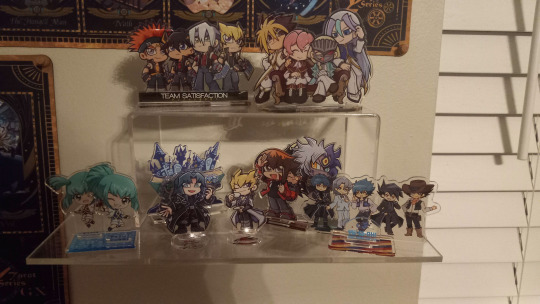
god i need to get another riser for this thing sdhghgd WHOOPS
22. Favorite place you visited this year?
i always gotta bring up meow wolf whenever i go to a meow wolf experience--I went to Convergence Station in Denver this year and it was soooo cool WAAUUGHHHh i like house of eternal return and omegamart more but this giant alien ice cathedral still HITS AND ROCKS AND RULES

4 notes
·
View notes
Note
A few days had passed since Naomi received the strange letter. It almost seemed like a strange once-off event, until a second envelope was found. This time, the blocky writing was addressed to her, written as neatly as possible. There was a stamp in the top-right corner depicting a vivid, albeit slightly cartoonish, butterfly. The envelope felt bulkier than before. Not only was there the letter, there was also a heavier paper folded to fit in the envelope.
-
"Dear Miss Naomi,
It is very nice to meet you. Thank you for finding my letter and sending one back. It was very exciting to get a letter that was new. I like your drawing. I've put your letter on my corkboard so I can say 'good morning' and 'good night' to you, just like I do all my Neighbors.
It must be very exciting to live in a library. My friend Frank has a lot of books, and he is very clever. I'd bet you're very clever too if you have to take care of the books and your library. Was it sad to be alone for so long? It must be lonely to not be able to go anywhere. That's why I try to include Home in something every day. It likes to feel part of the Neighborhood.
Do Willa and Rags help you fix the library? Will they help you paint it?
I like fairy tales too. I thought about what was my favourite, so I asked my friend Sally. She's a star and an actor and has written lots of stories. She reminded me of the story of 'Jack and the Beanstalk'. I wish I could meet a giant. I'd like to be their friend. I wouldn't be scared of how big it is. Everyone is taller than me, ha ha ha.
Sally told me to tell you that she knows you can't come visit, but you need to know about her shows. We drew a picture of her version of the story called 'Sally and the Beanstalk'."
(Sure enough, the second folded picture was of a brightly coloured, star-headed figure standing beside the base of a beanstalk that grew off the page.)
"I also like stories about friendships. I think everyone should have a friend. Wouldn't that be the most? I'm glad you have friends with you, Miss Naomi. It makes every day a happy one to know you can spend it with people that you like.
Wally."
(heythereneighbor)
The letter arrives in the evening, after a day's work cleaning the patio and moving planter boxes around. Naomi finds it just as she emerges from the walk-in closet, tying the bow on her sailor-collar pyjamas, and smiles to herself.
She opens it the next morning over breakfast, and is careful not to get any fried egg yolk on it as she eats. It takes her some time to formulate her answer - and those planter boxes aren't quite how she likes them - so she doesn't sit down to answer until that afternoon, and even then, it takes a while to collect her thoughts.
So it won't be until about three days pass that her letter to Wally appears in what must be a very confused Eddie's mail bag. For now, she takes her time:
"Dear Wally,
Thank you for your response! It was also very nice to get a surprise letter. I don't have a cork board yet, so I'm keeping it on my desk until I get one.
I don't think "exciting" is the word I'd use, but it's quite pleasant here. Lullaby Lane is a very quiet road, so I have plenty of peace and quiet when Willa and Rags are resting or busy."
She stops and ponders the question that comes next, and hums to herself.
"Hey, Library, were you lonely before I got here?" A long, slow breeze blows outside the window, and she hums.
"I asked the Library if it was lonely before I got here. It can't talk with words, but it uses its doors and floorboards and the wind to communicate with me. I think its answer was yes, but these days it seems quite playful. It had Dust Bunnies (they're very small), but nobody else came or went for... I don't know how long, actually."
Willa helps me with the library, but Rags mostly keeps me company. He's a very silly monster from under my bed, and likes to run around in the tall grass outside and play hide-and-seek. I'll draw a picture of him and Willa on the back today."
She smiles at the description of Jack and the Beanstalk, and is charmed by the sight of the artwork.
"Speaking of drawings, thank you for the artwork! I bet your friend Sally is very talented. When you get the time, please tell her I said thanks for sharing her vision. I've never acted, but I do like to read stories aloud. Maybe one day I could narrate one of hers? That's probably a long time from now, though."
And the last part. She smiles.
...She does have friends now, doesn't she? Fancy that.
"I agree, Wally, having friends every day would be the most. I'm very lucky to have met all of them, and I seem to meet more every day! This library may have been lonely once, but I don't think that will be a problem again for a very long time. It sounds like you have many friends, too! You've mentioned Eddie and Home, and now Frank and Sally. Is your neighborhood very big?
Once again, thank you for writing me.
Sincerely,
Miss Naomi.
Once again it's sealed and addressed in a blue envelope, but this one is sealed with a goldfish sticker and a matching stamp. She drops it in the slot on the letterbox, and smiles when she doesn't hear it fall.
It's on its way.
@heythereneighbor
1 note
·
View note
Text
i need a giant corkboard and 16 different colors of string with sticky notes to match. with these i will construct the homestuck timeline
1 note
·
View note